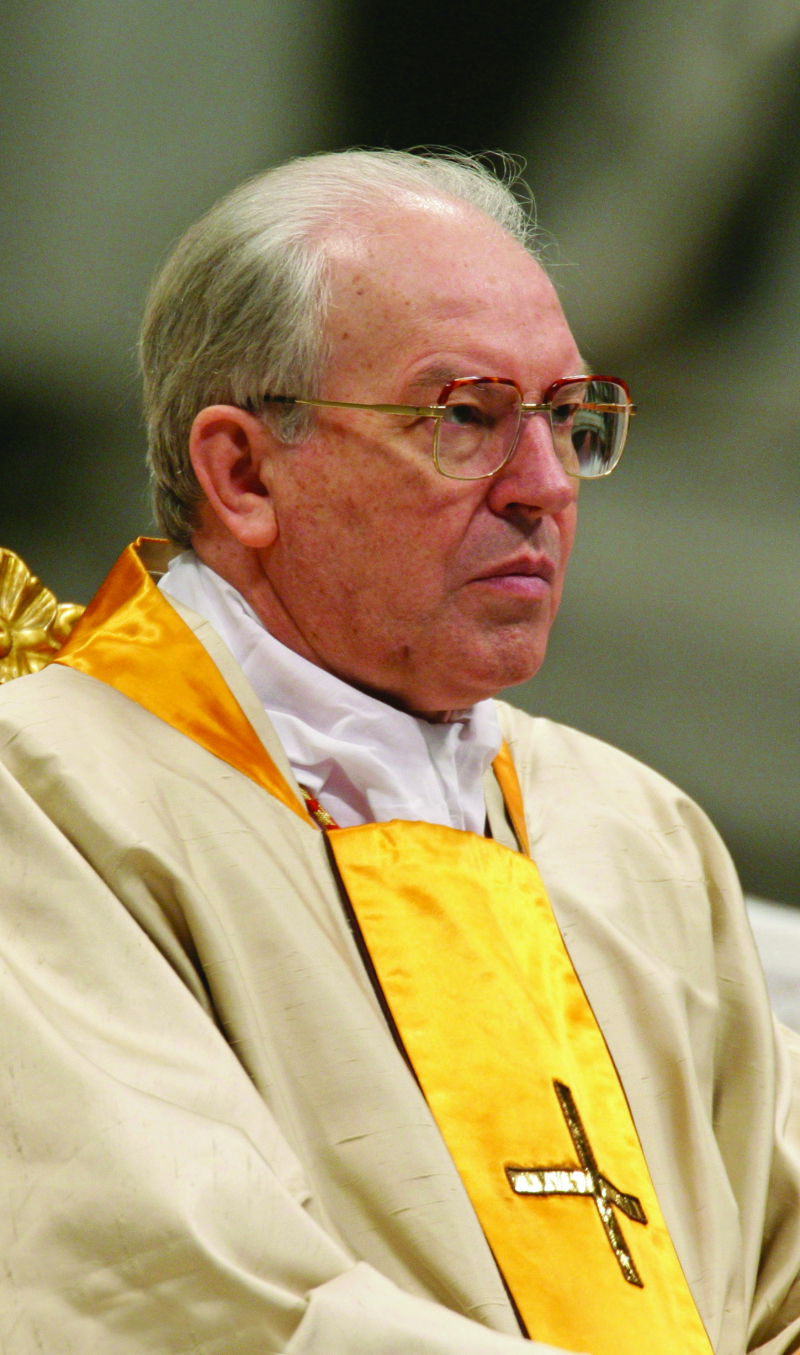
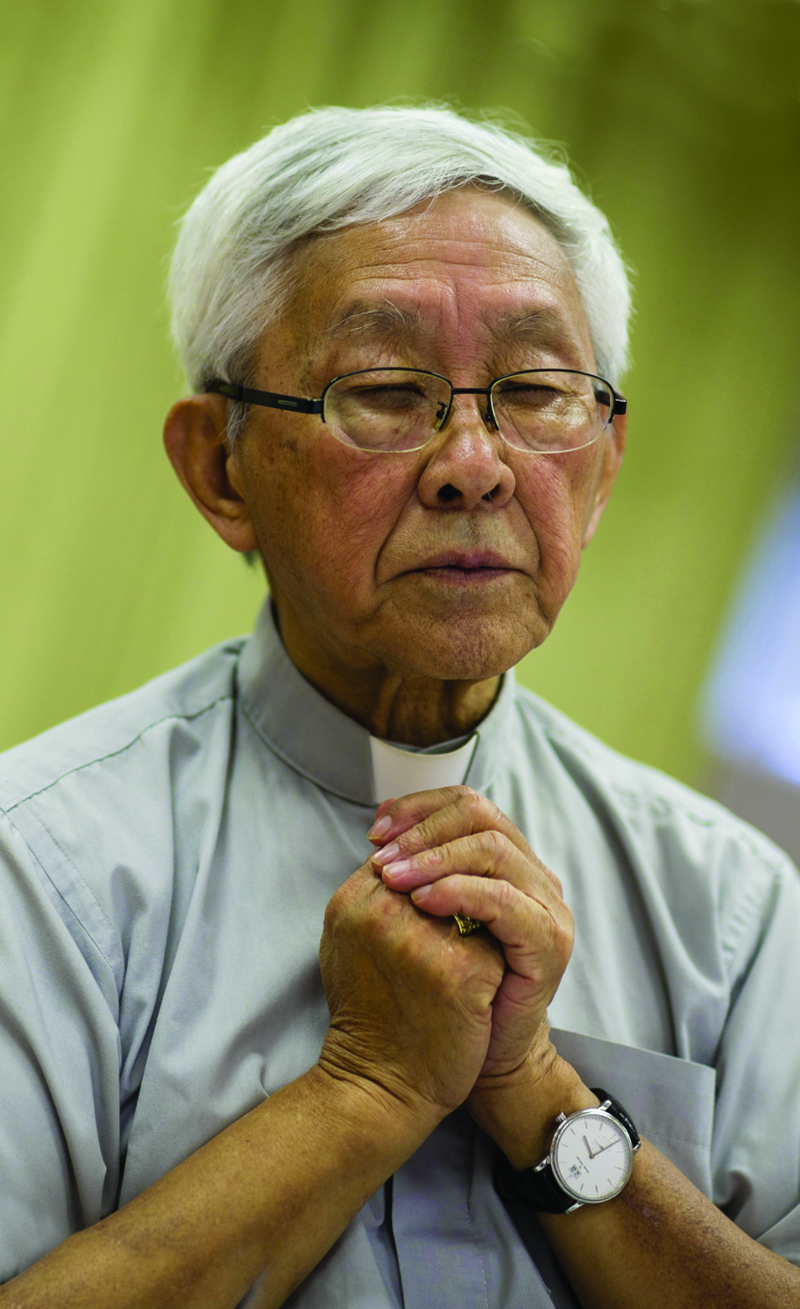
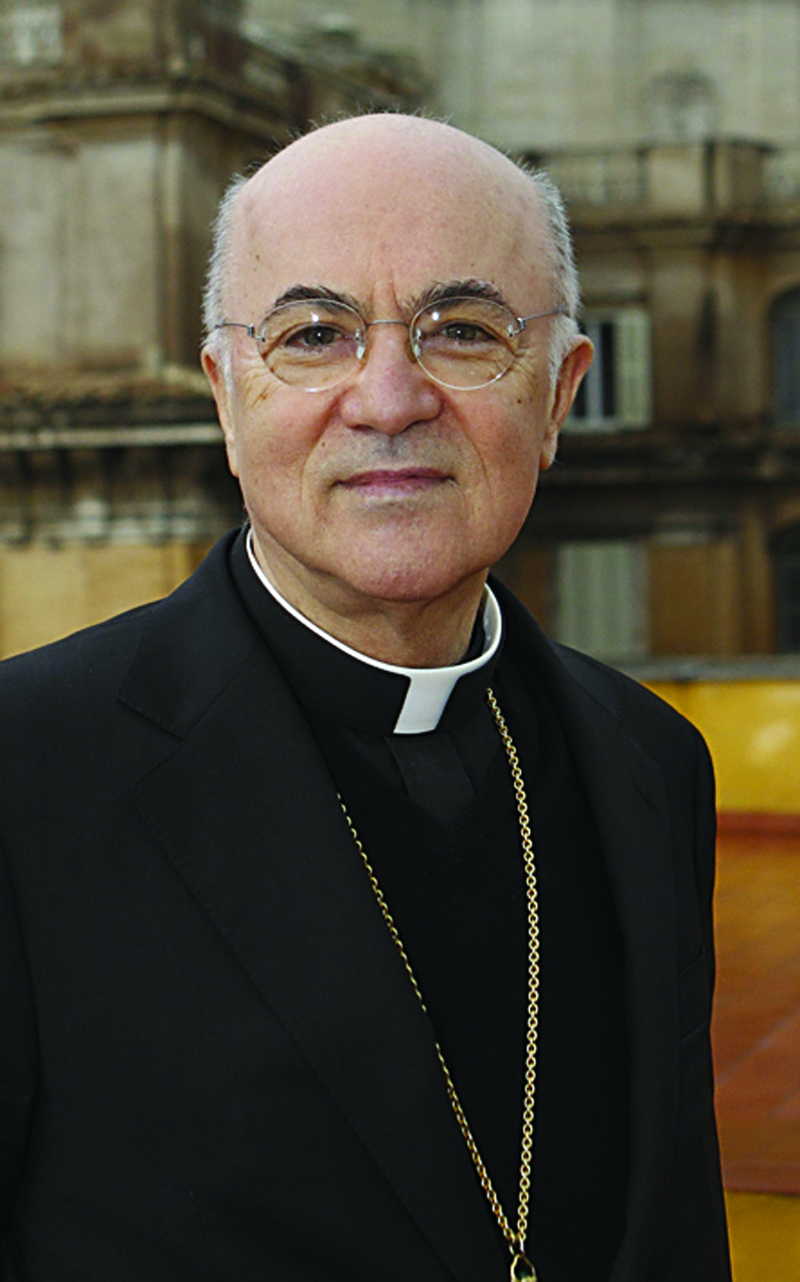
Photos Left to Right: Cardinal Re, Cardinal Zen, Archbishop Vigano
Conflict Abounds at the Highest Levels of the Church. Chinese Cardinal Zen Calls It a “Brutal Accord” That Pope Benedict Refused to Sign; Cardinal Re Denies This. Exiled Archbishop Viganò, Meanwhile, Defends Zen Against His Attackers
By Robert Moynihan
As the world, from China to South Korea to Iran to Italy and now to the United States as well, is deeply troubled by fears of a virulent flu virus apparently originating in Wuhan, China, we have now also had a flurry of odd activity at the top of the Catholic Church — as Pope Francis himself seemed to have developed a cold which itself led to wild (and not in any way verified) rumors
about his own health.
The activity, in some ways unprecedented, has to do with disagreements over Catholic Church (Vatican) accords with the Communist government of China.
On February 26, Wednesday, Italian Cardinal Giovanni Battista Re, 86, recently appointed by Pope Francis the new Dean of the College of Cardinals(succeeding Cardinal Angelo Sodano, 92) sent a letter to all the cardinals of the Catholic Church in which he sharply criticizes Cardinal Joseph Zen Ze-kiun, S.D.B., 88, born in Shanghai, China.
Zen, for his part, has for nearly two years been criticizing a secret (the text of the accord has never been released) 2018 Vatican accord with China which allows the Communist government a role in naming the bishops of the Catholic Church in China.
A letter Zen wrote to his fellow cardinals on September 17, 2019, is a particular object of Cardinal Re’s critique.
On February 26, Re, in his very first act as the new Dean of the College of Cardinals, said Zen’s criticisms of the Holy See-China Accord are misguided and should be discounted. In short, as of then, we clearly have had “cardinal against cardinal.”
And then, Archbishop Carlo Maria Viganò, himself a lifelong Vatican diplomat and in fact for decades a close collaborator of Cardinal Re, nevertheless sprang promptly to a passionate defense of Cardinal Zen against Re’s charges. (See below for the text)
This report and supporting documents is an attempt to provide some context for this controversy, by publishing the complete texts of the interventions. A blessed Lenten season for all, in faith and hope, despite the sins and worrisome fears of this present time. We entrust ourselves now as always to the love of Jesus Christ through the intercession of the Blessed Virgin Mary.
Summary report from Catholic News Agency
Cardinal Re Claims Cardinal Zen is at Odds With John Paul II, Benedict XVI on China
Vatican City, February 29, 2020
(CNA)—The newly-appointed Dean of the College of Cardinals purportedly sent a letter to
cardinals February 26 claiming that the China-Vatican deal represents the minds of St. John Paul II and of Benedict XVI, and that Cardinal Zen is mistaken in his opposition to the deal.
An Italian text of the letter from Cardinal Giovanni Battista Re, dated Feb. 26,was published Feb. 29 by La Nuova Bussola Quotidiana.
“I desire first of all to emphasize that, in their approach to the situation of the Catholic Church in China, there is a profound symphony of the thought and of the action of the last three
Pontificates,which—out of respect for the truth — have favored dialogue between the two parties and not contrariety,” Cardinal Re wrote.
“Cardinal Zen has affirmed several times that it would be better to have no accord than a ‘bad accord.’ The three last Popes did not share this position and supported and accompanied the drafting of the accord that, at the present moment, seemed to be the only one possible,” he stated.
Cardinal Joseph Zen Ze-kiun, Bishop Emeritus of Hong Kong, has been an outspoken opponent of the 2018 agreement between the Vatican and the People’s Republic of China regarding episcopal appointments.
The Church in mainland China has been divided for some 60 years between the underground Church, which is persecuted and whose episcopal appointments are frequently not acknowledged by Chinese authorities, and the Chinese Patriotic Catholic Association, a government-sanctioned organization.
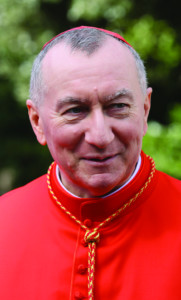
Cardinal Parolin
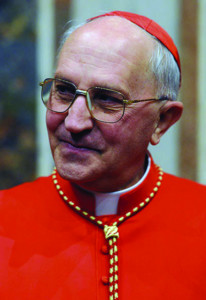
Cardinal Filoni
The agreement between the Holy See and Beijing was intended to normalize the situation of China’s Catholics and unify the underground Church and the CPCA.
That accord was eventually reached, Cardinal Re said, and signed in Beijing Sept. 22, 2018.
It is particularly surprising to the dean of cardinals that Zen has written that “the accord signed is the same one which Pope Benedict had, at the time, refused to sign.”
“That assertion does not correspond to truth,” Cardinal Re stated.
Cardinal Re was an official of the state secretariat from 1989 to 2000.
Because the deal provides for the Pope’s intervention in bishops’ appointments in China, the dean said, “the expression ‘independent Church’ can no longer be interpreted in an absolute manner, as ‘separation’ from the Pope, as was the case in the past.”
“Unfortunately, there is slowness in drawing in loco all the consequences which derive from this epochal change both on the doctrinal and on the practical level, and there persist dolorous tensions and situations,” Cardinal Re said.
Cardinal Re objected to Cardinal Zen’s evaluation of the Pope’s pastoral guidelines concerning the civil registration of clergy in China, saying that these guidelines “were designed precisely to safeguard the faith” in complicated and difficult situations.
Those guidelines recognize the choice of those who feel that they cannot in good conscience register with the government and accept sinicization.
However, reports indicate that those who decline to register are facing harassment and persecution.
The Vatican-China deal has been roundly criticized not only by Cardinal Zen, but also by human rights groups and religious freedom advocates in the US, and the Holy See has taken pains to defend and promote it.
Less than two weeks before Cardinal Re’s letter was sent, the Holy See publicized a meeting held between its Secretary for Relations with States and the Chinese foreign minister, during which the accord on episcopal appointments was discussed.
In March 2019,Cardinal Fernando Filoni, then-prefect of the Congregation for the Evangelization of Peoples, said that the accord “will be a very good thing for the Church,” and he criticized those who “run the risk of rowing out of sync within the barque of Peter.”
And one year ago, Vatican Secretary of State Cardinal Pietro Parolin — whom Cardinal Zen holds as bearing primary responsibility for the deal — said at a conference that the agreement must be implemented.
Cardinal Zen told CNA Feb. 11 that “the situation is very bad” in China, and added that “the bad things come from [Parolin].”
According to Cardinal Zen, Cardinal Parolin is “so optimistic about the so-called ‘Ostpolitik’, the compromise.”
But, Cardinal Zen told CNA, “you cannot compromise” with the Chinese Communist Party, whom he called “persecutors” of the faith.
“They want complete surrender. That’s Communism.”
“More and more, the Church [is] under persecution,” Cardinal Zen said, “both the official Church and the underground.”
Cardinal Re’s February 26, 2020 Letter to All the Cardinals
The Vatican, February 26, 2020
Prot. N. 1/2020 – English translation:
Lord Cardinal,
With reference to diverse public statements by Cardinal Joseph Zen Ze-kiun, S.D.B., in particular to his letter of September 17, 2019, which he sent as Bishop Emeritus of Hong Kong to us members of the College of Cardinals, I feel the duty to share some considerations and to offer my own contributions which favor a serene evaluation of these complex questions in regard to the Church in China.
I desire, first of all, to point out, that in the approach to the situation of the Catholic Church in China, there is a profound agreement of thought and of action among the last three Pontiffs,
which — in respect of the truth — has favored dialogue between the two Parties and not their opposition. In particular, they had in mind the delicate and important question of the nomination of Bishops.
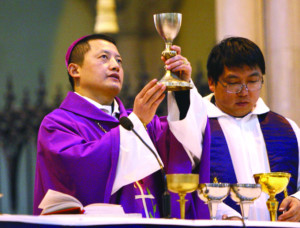
A priest consecrates the Eucharist in Shanghai, China (CNS photo/Nancy Wiechec)
Thus, Saint John Paul II, if he favored in part the return to full communion of the Bishops illicitly consecrated in the course of the years beginning in 1958, and at the same time had the desire to support the life of the “underground” community which was led by “un-official” Bishops and priests, on the other hand promoted the idea of arriving at a formal Accord with the governing Authorities on the nomination of Bishops. Such an Accord, the composition of which took much time, more than 20 years, was signed at Peking on Sept. 22, 2018.
Cardinal Zen has affirmed several times that no Accord would have been better than a “brutal Accord.” The last three Pontiffs did not share such a position and have supported and accompanied the crafting of the Accord which, at the present, appeared to be the only one possible.
In particular, the affirmation of the Cardinal that “the signed accord is the same which Pope Benedict had, in his own time, refused to sign” is a surprising one. Such an assertion does not correspond to the truth.After having taken cognizance of the documents existing in the Current
Archive of the Secretary of State, I am able to assure Your Eminence that Pope Benedict XVI approved the project of the Accord on the nomination of Bishops in China, which was only able to be signed in 2018.
The Accord foresees the intervention of the authority of the Pope in the process of nominations of Bishops in China. Even from this certain fact, the expression “independent Church” cannot be interpreted in an absolute manner, as “separation” from the Pope, as it has been in the past.
Unfortunately, there is a delay in seeing all the consequences in practice which derive from such an epochal change both on the doctrinal plane and on the practical one and there remain tensions and sorrowful situations.
It is unthinkable, on the other hand, that a partial Accord — the Accord touches upon, in fact, only the theme of the nomination of Bishops — changes things as if in an automatic and immediate manner even in the other aspects of the life of the Church.
Cardinal Zen, in evaluating the “Pastoral Orientations of the Holy See on Civil Registration of the Clergy in China,” of June 28, 2019, writes: “A test contrary to the Faith is signed and it declares that the intention is to favor the good of the community, a more adequate evangelization, a responsible care of the goods of the Church. This general norm is obviously against every principle of morality. If accepted, it would justify apostasy” (see “Dubia”). The Pastoral Orientations,” on the contrary, have been thought out precisely to safeguard the Faith in such complicated and difficult situations which would put personal conscience in a crisis.
The Cardinal, then, in his letter speaks also of the “slaughter of the Church in China by the party which should protect Her and defend Her from Her enemies” and, in particular, in an interview, addresses Catholics with these words:“Wait for better times, return to the catacombs, Communism is not eternal” (New York Times, Oct. 24, 2018). This deals, unfortunately, with very heavy affirmations which contest the very pastoral guidance of the Holy Father even in his relations with “underground” Catholics, notwithstanding that the Pope has not omitted to listen repeatedly to the Eminent Cardinal and to read his numerous missives.
Dear confrere, this anguished intervention of Cardinal Zen helps us to understand how much the path of the Church in China is still difficult and how complex is the mission of Shepherds and of the Holy Father!
Consequently, we are all of us called to be closely united with him and to pray intensely so that the Holy Spirit support him and support the communities of the Catholic Church in China, which although suffering for a long time, show their fidelity to the Lord, in the path of reconciliation, of unity and of mission in the service of the Gospel.
Wishing you all good, I cordially salute you,
+ Cardinal Re
Archbishop Viganò Defends Cardinal Zen
Archbishop Viganò’s Open Letter in Support of Zen’s Position on the Controversial Holy See-China Accord
February 29, 2020
Dearest Eminence,
This is Archbishop Carlo Maria Viganò, former Apostolic Nuncio to the United States of America.
I have followed deeply — sharing in prayer your suffering — your many heartfelt appeals to Pope Bergoglio concerning the tragic situation of the Martyr Church in China, which he himself has culpably aggravated through the treacherous and wicked secret Agreement signed by Holy See with the Chinese Communist government.
Your heartfelt appeals, dear Brother in Christ, have systematically been unheeded and even mocked in a hypocritical and perverse way. As for Cardinal Parolin, he has acted as a mere reckless executor of an evil order from above.
I read this morning the ignominious and shameful letter that Cardinal Giovanni Battista Re has addressed to all the cardinals against you. I am deeply saddened and indignant, and I wish to express to you all my affection, prayer and fraternal solidarity in the episcopate.
You are a courageous Confessor of the Faith and you have all my esteem and veneration!
Unfortunately, in the Vatican, lying has been set into the system, truth has been totally overturned, and the most perverse deception is shamelessly practiced even by the most unsuspected figures, who have now given themselves over to acting as accomplices of the Adversary. They have even gone so far as to say that “Pope Benedict XVI had approved the draft Agreement” signed in 2018, when instead we all know of his strenuous resistance and repeated disapproval of the conditions imposed by a persecutory and bloody regime.
The Vatican has done everything and more to deliver the Chinese Martyr Church into the hands of the Enemy: it did so by signing the Secret Pact; it did so by legitimizing excommunicated “bishops” who are agents of the regime; it did so by the deposition of legitimate bishops; it did so by forcing faithful priests to register with a church that has succumbed to the Communist dictatorship; it does so on a daily basis by keeping silent about the persecutory fury that has gained unprecedented strength, precisely since the signing of that unfortunate Agreement. It is now doing so with this ignoble letter to all the cardinals, which is aimed at accusing you, denigrating you, and isolating you.
Our Lord assures us that nothing and no one will ever be able to snatch from His hands those who resist the infernal enemy and his acolytes, conquering them “by the Blood of the Lamb” and by the testimony of their martyrdom (cf. Rev. 12:11).
Your example, dear Cardinal, and the very high price you are paying to defend the Cause of God and His Church, gives us a salutary jolt, it rips us from the inertia and habituation with which we are passively witnessing the surrender of the Catholic Church, at its highest levels and in its hierarchy, to heresy and apostasy, by following the Prince of this world, who is a liar and murderer from the beginning (cf. Jn 8:44).
Parce, Domine, parce populo tuo, quem redemisti, Christe, sanguine tuo, ne in aeternum irascaris nobis.
(“Spare, Lord, your people whom you redeemed by your blood; be not angry with us forever.”)
+ Carlo Maria Viganò
Titular Archbishop of Ulpiana,
Apostolic Nuncio
Pope Emeritus Embroiled in the Zen-Re Conflict
Meanwhile, Chinese Government Retains Firm Control
By Sandro Magister
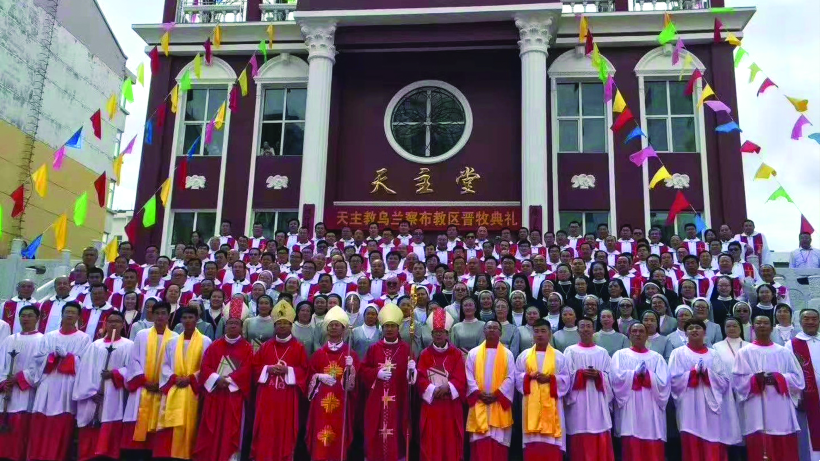 In the letter that the Dean of the Sacred College, Giovanni Battista Re, wrote on February 26 to all the cardinals, in contradiction to a previous letter addressed to them in September by Hong Kong’s Cardinal Joseph Zen Zekiun, there is one point on which the split between the two cardinals is absolute.
In the letter that the Dean of the Sacred College, Giovanni Battista Re, wrote on February 26 to all the cardinals, in contradiction to a previous letter addressed to them in September by Hong Kong’s Cardinal Joseph Zen Zekiun, there is one point on which the split between the two cardinals is absolute.
In the letter Zen had written, regarding the provisional and secret agreement of September 22, 2018, between the Holy See and China on the appointment of bishops: “I have cause to believe (and I hope one day to be able to demonstrate with archival documents) that the signed agreement is the same one that Pope Benedict had, in his day, refused to sign.”
To which Re rebutted: “This assertion does not correspond to the truth. After having personally taken stock of the documents kept in the current archive of the secretariat of state, I can attest that Pope Benedict XVI had approved the draft agreement on the appointment of bishops in China, which could be signed only in 2018.”
Zen’s rejoinder came on March 1 in an open letter to Re, in which the Chinese cardinal writes: “If you want to prove to me that the recently signed agreement was already approved by Benedict XVI, you just have to show me the text of the agreement, which I have been barred from seeing up to this point, and the archival evidence which you say you could verify. Then there remains to be explained why it was not signed at that time.”
In the absence of public documentation, it is difficult to say which of the two cardinals is more in the right.
However, we can get at the truth by retracing the whole history of the relations between the Holy See and China during the pontificate of Benedict XVI, from 2005 to 2013.
Benedict’s Historic Letter to Chinese Catholics
This is what one of the leading experts on the Chinese Catholic Church, Gianni Criveller, recently did in the chapter “An Overview of the Catholic Church in Post-Mao China,” which appeared in the volume People, Communities, and the Catholic Church in China, edited by Cindy Yik-yi Chu and Paul P. Mariani, published in Singapore in 2020.
Criveller, 59, of the Pontifical Institute for Foreign Missions, teaches at the Chinese University and the Holy Spirit College of Theology and Philosophy in Hong Kong. His essay has been translated in full and published in Il Regno, the most authoritative magazine of the progressive Italian Catholic camp.
Criveller’s essay is of extraordinary interest, especially where he deals with the differences between the two Catholic communities in China, the one with official recognition from the regime, severely subjugated, and the highly-endangered “underground” one, or where he explains the reasons and the effects of the “Chinafication” of the religions, and of the return to Confucianism, advocated by Chinese President Xi Jinping.
But limiting ourselves to what Criveller writes about the years of Benedict XVI’s pontificate, he does not hesitate to assign “historic” importance to the “Letter to Chinese Catholics” written by that Pope in 2007. And about the fate of the bishops in that country he writes :
“Benedict XVI asked the civil authorities to recognize the underground bishops. However, he admitted that ‘almost always’ the official bishops are obliged to ‘adopt attitudes, perform gestures and make commitments that are contrary to the dictates of their conscience.’Strangely, the phrase ‘almost always’ was omitted in the first Chinese translation issued by the Vatican, provoking the protest ofCardinal Zen.The Pope left it up to the individual bishops to determine the best course of action to be taken in their specific situations, that is, whether or not to seek recognition from the civil authorities.”
Criveller notes that “the Chinese government made every effort to downplay the significance of this letter.” And proof of this was the regime’s persistence in installing illegitimate bishops, that is, those not approved by Rome.
In 2006, the year before the letter was published, there had been three illegitimate ordinations.
After that, from 2007 to the summer of 2010, the new bishops were ordained with the consent of both sides, “although the approval,” Criveller points out, “was always given independently, without direct negotiations.”
Relations Deteriorate
But in the fall of 2010 the situation deteriorated again. The illegitimate consecration of Guo Jincai as bishop ofChengde,write Criveller, “caused a deterioration in relations between the Vatican and China.”And early the following summer two other bishops were consecrated without the Pope’s approval: Lei Shiyin in Leshan and Huang Bingzhang in Shantou. The affront was received in Rome with such alarm that for the first time the Holy See reacted by publicly declaring the excommunication of those bishops installed by the regime.
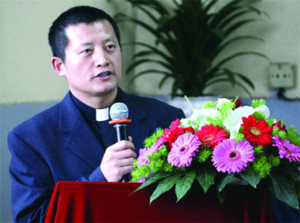
Joseph Xing Wenzhi
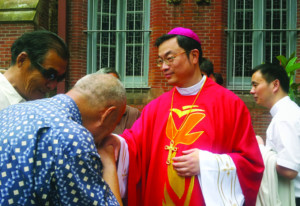
Thaddeus Ma Daqin
Meanwhile, in December 2010, a no less disturbing episode occurred, as described by Criveller:
“The government held in Beijing, with great fanfare, the eighth national assembly of Catholic representatives. The agenda of the meeting included the election of the new leaders of the Patriotic Association and of the Conference of Bishops [that is, the two bodies with which the regime exercises iron control over the official Catholic Church – ed.]. Joseph Xing Wenzhi, auxiliary bishop of Shanghai, went grudgingly to that controversial assembly. Once there, he participated in it with a passive attitude. He returned to Shanghai depressed, apologizing to his clergy for not being strong enough purely and simply to boycott the assembly. Right away the bishop’s personal life took a sad turn. Bishop Xing was accused by the secret police of having an affair with a woman. It was an alarming retaliation against a bishop who had shown the courage to resist the government’s policies.”
In April of 2012 there were two more ordinations approved by both sides, in Nanchong and Changsha, but the newly ordained “were forced to accept illegitimate bishops as consecrators.”
More Illegitimate Ordinations
Then again, on July 6 of that same year, there was another illegitimate ordination. Yue Fusheng was ordained bishop of Harbin “despite the request made by the Holy See to refuse the election.” The priests of that diocese who had opposed it were forced to write a letter of submission and to concelebrate with the illicit bishop. Again, the Holy See publicly announced the excommunication of the new bishop. Which, Criveller writes, “can be a significant example of how the Chinese authorities are capable, at times, of bringing onto their side people who previously had been explicitly loyal to the pope.”
Years earlier, in fact, while still an ordinary priest, Yue had been part of a delegation of Chinese priests authorized to participate in the Mass celebrated inManila on January 15, 1995, by John Paul II, visiting the Philippines for World Youth Day. And when at the beginning of the Mass the flags of the various national delegations were raised, including the flag of Taiwan, and in retaliation the political leaders of the Chinese delegation ordered them to abandon the ceremony, none other than Yue was one of the very few who had the courage to disobey and to stay, while today he “is known for his weakness and his adherence to the government.”
But even more revealing of the deterioration of relations between the Holy See and China, in that year 2012 which is the last glimpse of the pontificate ofBenedict XVI, is what happened in Shanghai on July 7, with the ordination of Thaddeus Ma Daqin in the cathedral as new auxiliary bishop.
Criveller writes:
“He was ordained with the approval of both sides. But the Chinese authorities imposed the presence of an illegitimate bishop, provoking the dismay of many priests, religious, and lay people who decided not to participate in the ceremony. Thaddeus Ma, in a shrewd maneuver, prevented the illegitimate bishop from laying his hands on him during the consecration rite.
“Towards the end of the Mass the new bishop declared that he wanted to be the pastor of all the faithful, so he would stop being a member of the Patriotic Association.
“An amateur video of Bishop Ma’s brief speech, publicly applauded by the people present in the cathedral, appeared for several days on various websites, until it was removed.
“Many thought the bishop’s gesture was courageous and prophetic.
But the government officials present at the Mass went into a state of great agitation and took him away by force that evening. Officials put the diocese under investigation, interrogating priests and nuns.
“After eight years,Thaddeus Ma is still under ‘house arrest’ in the Sheshan seminary. His 2016 ‘confessions’ were written in captivity and we do not know if they were sincere and if he did or did not regret what he had done.”
Benedict’s Approval Implausible
If this is the known, public fabric of the relations between the Holy See and China regarding the appointment of bishops between 2005 and 2013, it is not clear how to fit into this fabric the alleged “approval” during those same years, by Benedict XVI, of the agreement signed five years later.
This is an agreement whose contents are still kept secret and which has so far produced no new episcopal appointment, eighteen months after its signing, and, on the contrary, has been accompanied by a further “crackdown”—asCriveller writes at the beginning of his essay — in the regime’s control over the Catholic Church.
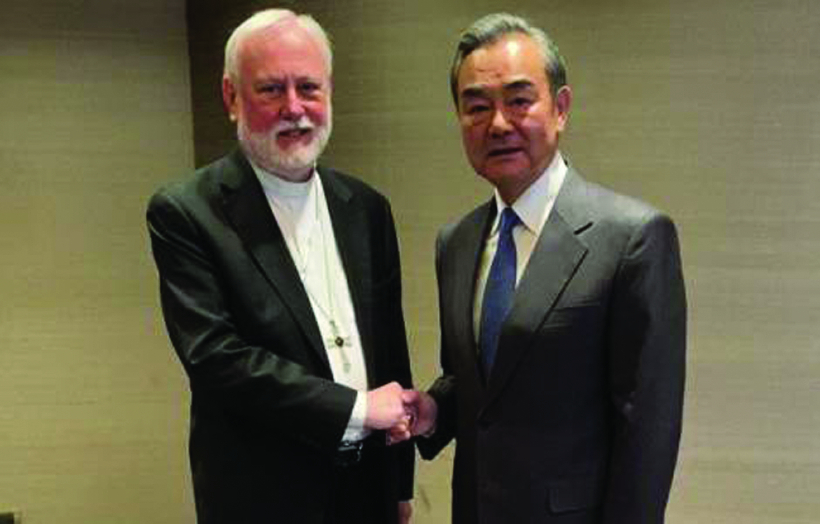
Archbishop Paul Richard Gallagher and Chinese Foreign Minister Wang Yi Saturday, February 15, 2020
It should also be borne in mind that with regard to China, Benedict XVI availed himself not only of the Secretariat of State, but also of an “ad hoc” commission in which Cardinal Zen had significant influence.
This commission has never been convened again during the pontificate of Francis.
It is therefore not to be ruled out that Pope Benedict was presented with draft agreements on the appointment of bishops, just as it cannot be ruled out that the Chinese side turned down, during those same years, potential proposals from the Vatican.
But that the agreement that Cardinal Re says was “approved” by Benedict XVI was identical to the one signed in 2018 remains entirely to be proven.
And given the narrative of those years, as reported most recently by Criveller, this seems implausible.
All the more so if one compares it with the “historic” letter written by Pope Benedict to the Chinese Catholics.
An “Asymmetrical” Deal
It should be added that Cardinal Re’s letter falls under a phase of intensification of the Holy See’s policy of the “hand extended” to the Chinese regime.
The letter bears the date of February 26.
And on the 14th of the same month, on the sidelines of an international conference in Munich, there was for the first time since the breaking of diplomatic ties in 1951 a meeting between the two foreign ministers of the Holy See and of China, Paul Richard Gallagher and WangYi (pictured).
The Vatican secretariat of state – headed by Cardinal Pietro Parolin, whom Zen holds to be the main culprit of the surrender — issued on the occasion a press release with very optimistic tones.
And on March 5, in a video message broadcast in nine languages, Pope Francis himself expressed the hope that “Chinese Christians may be truly Christians, and be good citizens,”with a recommendation that also included a rebuke to the resistance:
“They should promote the Gospel, but without engaging in proselytism, and they need to achieve the unity of the divided Catholic community.”
All this, so far, without any reciprocation from the Chinese, which has only benefited from the Vatican’s openness without paying the slightest price.
Exactly as with the 2018 agreement, which Criveller correctly calls “asymmetrical.”





Facebook Comments